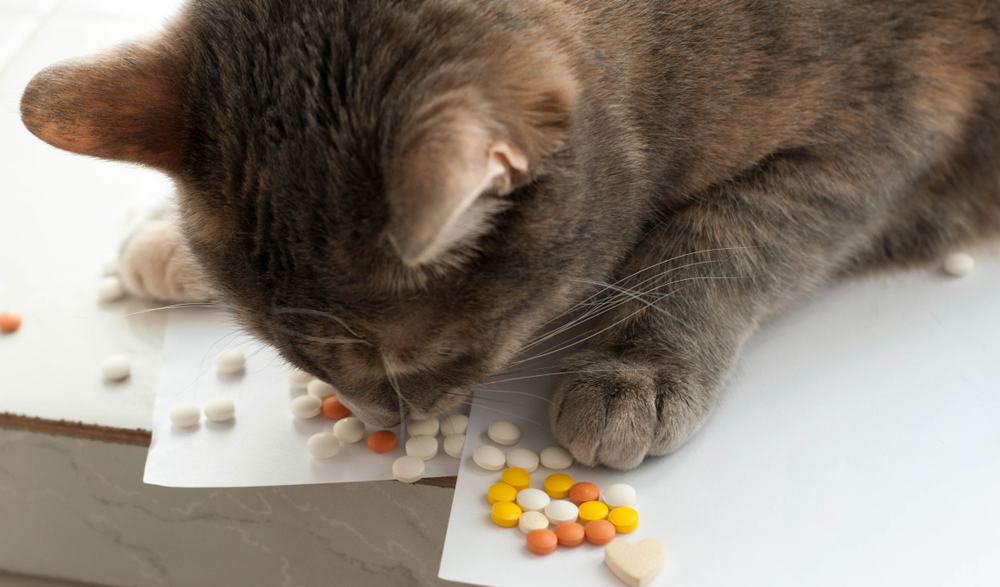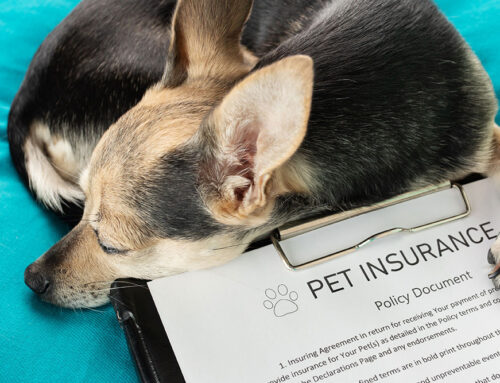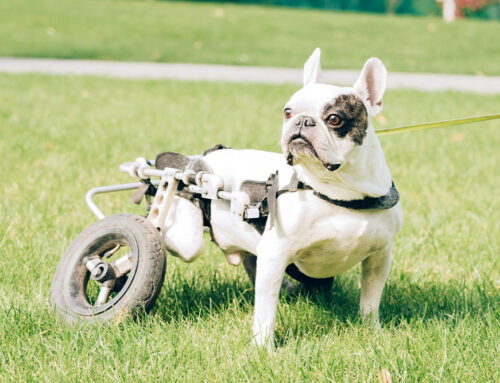Your pet has an incredible sense of smell, and that powerful sniffer can lead them straight into trouble. Many potential poisons in your home and yard smell intriguing or downright delicious to your furry pal, so keep your pet safe by knowing which toxins are lurking on your property. Familiarize yourself with the following five categories of the most common pet toxins.
#1: Rx for disaster: Medications and supplements
Whether or not medications have a prescription label, they spell disaster for your furry pal. Many products that are safe for people are toxic to pets, and even veterinarian-prescribed medications can be hazardous if your pet ingests them and overdoses. Common medications that lead to toxicity in pets include:
- Human prescription medications — Dropped pills or unattended bottles can be irresistible to a curious pet, who may ingest cardiac, antidepressant, or ADHD medications that lead to gastrointestinal (G) upset or kidney failure.
- Human over-the-counter (OTC) medications — People often give their pet OTC pain relievers, such as aspirin or acetaminophen, to help them with muscle injury pain. However, many of these medications are toxic to pets, or should be given to pets in a much lower dose.
- Flavored pet medications — While highly palatable prescriptions are a boon for medicating your pet, your four-legged pal may sniff out and gobble down their year’s supply of heartworm preventives.
- Chewable vitamins and supplements — Your daily vitamin in a chewable gummy form can be exceptionally appealing to your pet. Calming chews and joint supplements specifically formulated for pets are another common toxin, as pets may eat too many if they get into the bag.

#2: Food for thought: Fruits, vegetables, sweets, and more
Your pet may want to be your furry sous chef, but they should stay out of the kitchen while you are cooking and cleaning. Keep your trash can’s lid shut and locked, if possible, and place lunch boxes with leftover snacks well out of reach. Common foods toxic to pets include:
- Chocolate
- Coffee and caffeine
- Grapes, raisins, and currants
- Garlic, onions, leeks, and chives
- Macadamia nuts
- Alcohol
- Xylitol
- Yeast dough
#3: Blooms of danger: Flowers and plants
Plants that sprout in your garden or blooms that brighten up a bouquet can seriously endanger your pet. Some plants cause mild GI upset when eaten, whereas others can lead to kidney failure or heart problems. The most common plants poisonous to pets include:
- Autumn crocus
- Azaleas
- Cyclamen
- Daffodils
- Dieffenbachia
- Hyacinths
- Kalanchoe
- Lilies
- Lily of the Valley
- Oleander
- Sago palm
- Tulips
Before sprucing up your home with bright flowers or bold plants, check the ASPCA’s list of toxic plants.
#4: How does your garden grow? Fertilizers, pesticides, herbicides, and other “-cides”
You must be aware not only of poisonous plants in your garden, but also exercise caution with products that make them flourish. Fertilizers, particularly organic options made from bone meal, blood meal, or feather meal, are some of the most common garden toxins. Fertilizers that contain iron can cause iron poisoning, while others include pesticides, herbicides, insecticides, or other toxic chemicals. Unfortunately, compost is no safer for pets, because the toxic mold that grows there can lead to severe vomiting, diarrhea, tremors, and seizures.
Chemical sprays, such as pesticides, insecticides, and herbicides, affect your pet differently, depending on exposure type. Pets who inhale the chemicals can develop respiratory issues, while topical exposure can cause rashes or chemical burns on paws, skin, or in the mouth. Pets who eat treated grass or plants can experience vomiting, diarrhea, drooling, confusion, lethargy, increased thirst, seizures, collapse, coma, or death. Protect your pet by keeping them off the lawn and out of the garden for the recommended time—usually two to three days—after spraying any chemical.
#5: Keep it clean: Cleaning products, home improvement items, and craft supplies
Many hazards are hidden in your home, especially if your furry pal is skilled at opening cabinets that house chemicals. Some of the most common household toxins include:
- Cleaning products
- Paint
- Glue
- Spackle
- Paint thinner
- Essential oils
- Fabric softener sheets
- Grout
If ingested, these items can cause oral or esophageal ulcers, drooling, vomiting, diarrhea, central nervous system suppression, liver damage, and more.
If your pet runs afoul of a potentially toxic substance, contact an animal poison control hotline immediately for advice. They can tell you if the item is truly toxic, and whether you should rush them to our Star of Texas Veterinary Hospital for nursing care and monitoring. Contact our team before you are on your way, so we can prepare appropriately for your pet’s arrival.






